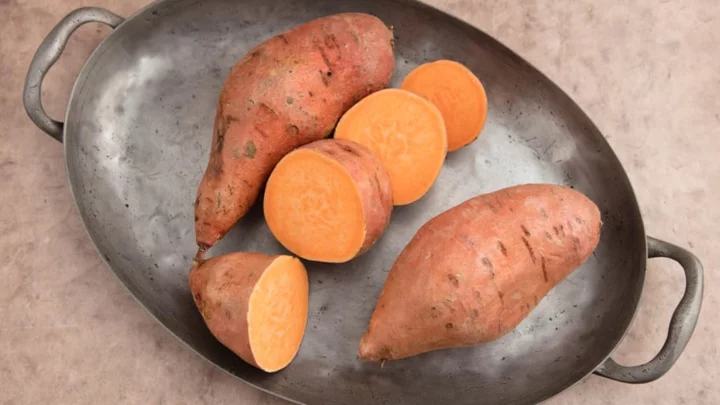This Thanksgiving, families across the country will enjoy a traditional meal of turkey, stuffing, and sweet potatoes ... or are they yams?
Discussions on the proper name for the orange starchy stuff on your table can get more heated than arguments about topping them with marshmallows. But there’s an easy way to tell the difference between sweet potatoes and yams: If you picked up the tuber from a typical American grocery store, it’s probably a sweet potato.
So what’s a sweet potato?
Sweet potato and yam aren’t just different names for the same thing: The two produce items belong to their own separate botanical categories. Sweet potatoes are members of the morning glory family. Regular potatoes like russets, meanwhile, are considered part of the nightshade family, which means that sweet potatoes aren’t actually potatoes at all.
Almost all of the foods most Americans think of as yams are really sweet potatoes. The root vegetable typically has brown or reddish skin with a starchy inside that’s orange (though it can also be white or purple). It’s sold in most supermarkets in the country and used to make sweet potato fries, sweet potato pie, and the sweet potato casserole you have at Thanksgiving.
Then what’s a yam?
Yams are a different beast altogether. They’re more closely related to lilies and grasses and mostly grow in tropical environments. The skin is more rough and bark-like than what you’d see on a sweet potato, and the inside is usually white or yellowish—not orange.
Yams are a common ingredient in parts of Asia, Africa, and the Caribbean. Because the inside of a yam is less moist than the inside of a sweet potato, they require more fat to make them soft and creamy. They’re also less sweet than their orange-hued counterparts. In many regions in the U.S., yams aren’t sold outside of international grocery stores.
Where did the yam and sweet potato mix-up come from?
So if yams and sweet potatoes are two totally different vegetables that don’t look or taste that similar, why are their names used interchangeably in the U.S.? You can blame the food industry.
For years, “firm” sweet potatoes, which have brown skin and whitish flesh, were the only sweet potatoes grown in the U.S. In the early 20th century, “soft” sweet potatoes, which have reddish skin and deep-orange flesh, entered the scene. Farmers needed a way to distinguish the two varieties, so soft sweet potatoes became yams.
Nearly a century later, the misnomer shows no signs of disappearing. Many American supermarkets still call their orange-fleshed sweet potatoes “yams” and their white-fleshed ones “sweet potatoes,” even though both items are sweet potatoes. But this isn’t a strict rule, and stores often swap the names and make things even more confusing for shoppers. So the next time you’re shopping for a recipe that calls for sweet potatoes, learn to identify them by sight rather than the name on the label.
Have you got a Big Question you'd like us to answer? If so, let us know by emailing us at bigquestions@mentalfloss.com.
A version of this story ran in 2019; it has been updated for 2023.
This article was originally published on www.mentalfloss.com as What’s the Difference Between Yams and Sweet Potatoes?.

